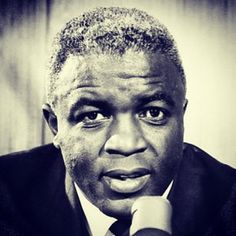Would Jackie Robinson Be A Republican Today?
 A couple of weeks ago, PBS aired the latest Ken Burns documentary on baseball legend Jackie Robinson. What stood out to me when I was watching this was his civil rights and political activism after retiring from baseball, and how similar the discussion was in the 1960s about the black vote and the Democratic party is to the conversation today in this year’s presidential election.
A couple of weeks ago, PBS aired the latest Ken Burns documentary on baseball legend Jackie Robinson. What stood out to me when I was watching this was his civil rights and political activism after retiring from baseball, and how similar the discussion was in the 1960s about the black vote and the Democratic party is to the conversation today in this year’s presidential election.
Soon after his retirement from the Brooklyn Dodgers, Robinson became a columnist for the New York Post, where he wrote mostly about non-sports related topics like lynchings in the South, school integration, and even the perceived racism in the Red Sox organization for being the last baseball team to not have a black player.
Politically he considered himself an independent who had torn support for FDR’s New Deal and and the Party of Lincoln. Robinson was a supporter of the two-party system and looked at the issues and not the party affiliation. He thought it was bad for African-Americans to vote in lock stock for Democrats all the time because they lost leverage on issues concerning them. From the end of the Civil War up until the 1940s, most African-Americans were Republicans.
He first leaped into politics with the 1960 presidential election when he declared his support for Richard Nixon. While his civil rights record wasn’t all that great, Robinson saw potential for Nixon to do better by African-Americans. On the other hand, John F. Kennedy didn’t really take the civil rights movement seriously either and picked Texas governor Lyndon B. Johnson to be his running mate to appease white southerners.
Martin Luther King may have had a significant role in solidifying the black vote for Democrats for years to come when he was arrested and sentenced to a chain gang at a Georgia prison for four months for a trumped up traffic violation two weeks before the election. Robinson asked Nixon to help get King out of jail, but Nixon refused. Meanwhile, Kennedy called Coretta Scott King to comfort her and his brother Robert made the arrangements to get King out of jail. The phone call was spearheaded by Kennedy’s civil rights aide Harris Wofford (who is making news for other reasons this week). After this, black voters returned the favor to Kennedy by helping him get elected in a race that was decided by only 100,000 votes.
Robinson was punished for his Nixon support when his column was permanently cancelled in the then liberal New York Post.
In 1964 Robinson got back into presidential politics by supporting the then Republican Gov. Nelson Rockefeller, who was socially liberal and fiscally moderate. White Republicans turned to support the more conservative Barry Goldwater, who was against the Civil Rights Act of 1964 and openly supported his racist supporters in his presidential campaign.
Robinson protested Goldwater, saying he was a bigot and was setting the country backwards.
“I’m an American Negro first, than a member of any party,” Robinson said.
During the 1964 GOP convention, Robinson and other black Republicans were harassed on the convention floor. Many members of the KKK were also at the convention to support Goldwater. While Goldwater got the Republican nomination, he was ultimately beaten by LBJ.
Even since then, Republicans have struggled to regain a significant black voter base. The GOP has embarked on several “minority outreach” initiatives over the years. But all that work to bring back black voters to the Republican party may have been set back by 50 years with the rise of Donald Trump, who is using Goldwater tactics in his own campaign.
Nonetheless, Robinson was right about blacks only voting for one party all the time. Sure, the GOP needs to do better to get our vote, but so do the Democrats. Because of this longtime support, Democrats have now taken for granted the black vote. The way Hillary Clinton has handled the controversy around her husband’s 1994 crime bill has bothered many black people, with the thinking that the Democrats would be handling it differently if they knew they could lose the black vote because of it. And let’s not forget Clinton’s continuously offensive hot sauce, CP Time pandering to black people. But it won’t even matter because she will mostly likely still get the majority black vote.
I too try to look at the issues before party affiliation. I mostly support the Democrats because their policies are more inline with my perspective, not necessary because of party loyalty. I’m not a staunch Hillary supporter; I just think she is the lesser of the five evils currently running for president and she would be ready to lead on day one because of her experience. I think it is also important to be an informed voter, and that is why I have watched most of the Republican and Democratic debates, town halls, rallies and forums so I can make an informed decision in November.
As for Jackie Robinson, I don’t know what his party affiliation would have been today. But after viewing the documentary, I got the impression that if Robinson hadn’t died suddenly from a heart attack in 1972, he would have ran for a political office himself. He would certainly be calling out Trump on his bigoted ways, unlike Ben Carson. If he became a politician, he would have definitely have had a significant influence on black voters today, regardless of political affiliation, and that would have been interesting.